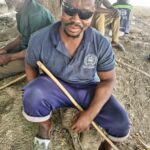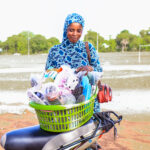In response to escalating violence in Burkina Faso, over 8,000 asylum-seekers have crossed into Ghana’s Upper East Region seeking safety. While many have settled in local border communities, approximately 1,567 individuals are now residing in a designated reception center and settlement in Tarikom.
To date, 3,569 asylum-seekers have been officially registered in the region (UNHCR, 2024). The sudden influx of people has placed a tremendous strain on local resources, especially in an area already grappling with food insecurity and limited infrastructure.
Since August 2023, the World Food Programme (WFP) has provided emergency food assistance, supporting 5,820 members of the host communities and distributing cash-based transfers (CBT) to 1,535 asylum-seekers. While these efforts have offered short-term relief, long-term, sustainable solutions are urgently needed to promote self-reliance and resilience.
The Livelihood Enhancement and Agricultural Development for Sustainability (LEADS) project addresses the humanitarian and economic challenges in Ghana’s Upper East Region. The project targets 245 households (80% asylum seekers, 20% host community) with 2,254 members (50% women), aiming to strengthen food security, economic resilience, and social cohesion. Through climate-smart agriculture, vocational training, and gender- and nutrition-responsive interventions, the project is supporting the beneficiaries in vegetable (75), grain and legume (65), guinea fowl (30), livestock (40), and aquaculture (15) production, as well as skills development (20). The Project fosters economic empowerment, market integration, and self-reliance, reducing dependency on humanitarian aid while enhancing the livelihoods of the beneficiaries in Tarikom. Tilli, Timonde, Sapelliga, Widnaba, and Tarikom Refugee Reception Centre (TRRC).

